|
[I used to do "morning pages" on the regular, but I've gotten out of the habit. It's a way to get all my thoughts out so my mind can just focus on fiction. But lately I've been dabbling in creative nonfiction, too, so I've decided to start posting some of these entries. Here goes nothing.] The barista calls me “hon” twice while filling my order for an English Breakfast tea. She is probably twenty years younger than me, which means I have possibly reached the age where age is a liability, where age makes me grandmotherly, where age means I have to be talked to loudly and slowly, in a patient customer service voice.
I pay the $3.45, which is basically just for the tea bag. The manager compliments my shoes, which are green, and asks if I wore them just for today. It’s not until I’m sitting down with my laptop open that I realize it’s St. Patrick’s Day and for possibly the first time in my life I have unconsciously dressed appropriately for the situation. “We’re all out, I’m sorry,” the barista says to someone picking up a mobile order. The man looks annoyed, takes his drink in disgust, and leaves through the double doors, which flap shut behind him. Someone taps me on the shoulder and I jump. I’ve been thinking about nouns and verbs, and when I think I imagine I’m invisible. “Is there a code for the bathroom?” the woman wants to know. She is old enough to be my grandmother, although really I’m referring to the age my grandmother was when I was younger, because if alive, both of my dead grandmothers would be well into their 100s. It’s only because I’m startled by the touch that I don’t help her. I know the code. I’ve heard the baristas sing it out to every other person who enters. “You can ask for the code at the counter,” I tell her, and go back to thinking. Out the window, cats slink by, dash under the outdoor furniture, scuttle around the corner and disappear into the bushes by the drive-thru. Why doesn’t someone adopt one of these cats? Why don’t I adopt one of these cats? That’s crazy, I can’t have a cat. The Usual Couple come in. I see them here often and wonder how they can afford treinte iced teas and grande mochas every day, since they are clearly retired and drive a car that has had a sizeable dent as long as I’ve been aware of them. He has had an injury of some kind and walks deliberately now, one foot forward and the other forward exactly to the place where the first foot stops, and repeat. I wonder why the wife who can clearly afford Starbucks on the daily doesn’t spring for a haircut; she would look so much better. But even as I think it, I know that’s rude of me. Once I heard the husband refer to Michelle Obama as a man, and so by default I don’t like them. But also once I saw him pay for a homeless man’s coffee and sandwich, and sometimes people are more complex than they seem at first sight. Not all good, not all bad, not always wrong, not always right. The weather is lovely and so we aren’t talking about it. People enter in shorts, exit to linger under the green umbrellas to smoke and chat with friends. Four women have been talking at a table on the other side of the restaurant for a couple of hours now, ever since I entered with the big plans for what I was going to write, how I was going to revive my flagging writing career, how I was absolutely not going to go online and look for a new dress for an occasion that hasn’t yet presented itself to me. One of the women is the one who tapped me on the shoulder. I decide to forgive her for this, since anyway she doesn’t know there is anything to forgive, and the burden is all mine. The women look happy. The women are glad to have each other in their lives. A young couple comes in. Young is relative, like old, or older. They are each wearing hoodies and joggers and carrying books. Maybe they are coming right from campus, which is just over the freeway. Maybe they have met to study. Maybe they meet here every day before class because they can’t imagine a day where they don’t see each other. A man smiles at me as he enters, and I wonder if he thinks I’m someone else. It takes a beat before I remember how to engage my facial muscles, and I smile back.
1 Comment
Ok, so I'm late with this list. Also, for the first year in a long time, I didn't meet my reading goal. I planned to read 75 books and read 69. But the teacher in me knows this is a 92%, so I don't feel too bad. :) Here's the list! 1. Real American by Julie Lythcott-Haims 2. The People We Keep by Allie Larkin 3. Malibu Rising by Taylor Jenkins Reid 4. The Ungrateful Refugee by Dina Nayeri 5. Embassy Wife by Katie Crouch 6. My Darling Husband by Kimberly Belle 7. Hell of a Book by Jason Mott 8. The Last Karankawas by Kimberly Garza 9. One Night, New York by Lara Thompson 10. Watch Out for Her by Samantha M. Bailey 11. The Rib King by Ladee Hubbard 12. Crying in H Mart by Michelle Zauner 13. Dark Roads by Chevy Stevens 14. American War by Omar El Akkad 15. Hard Cash Valley by Brian Panowich 16. No-No Boy by John Okada 17. Dietland by Sarai Walker 18. The Guest List by Lucy Foley 19. The Many Daughters of Afong Moy by Jamie Ford 20. The Pull of the Stars by Emma Donaghue 21. Cultish: The Language of Fanaticism by Amanda Montell 22. Pieces of Her by Karen Slaughter 23. Transcendent Kingdom by Yaa Gyasi 24. The Other Black Girl by Zakiya Dalila Harris 25. Nowhere Girl by Cheryl Diamond 26. Blue-Skinned Gods by SJ Sindu 27. Ralph's Party by Lisa Jewell 28. Stay and Fight by Madeline Ffitch 29. The Hunting Party by Lucy Foley 30. Reputation by Sarah Vaughn 31. Five Little Indians by Michelle Good 32. The Henna Artist by Alka Joshi 33. The Woman in the Library by Sulari Gentill 34. The House on Fripp Island by Rebecca Kauffman 35. Sankofa by Chibundo Onuzo 36. Marriage of a Thousand Lies by SJ Sindu 37. Wish You Were Here by Jodi Picoult 38. The Maid by Nita Prose 39. The Signature of All Things by Elizabeth Gilbert 40. Saint X by Alexis Schaitkin 41. Crossroads by Jonathan Franzen 42. Goldilocks by Laura Lam 43. Mrs. Everything by Jennifer Weiner 44. Remarkably Bright Creatures by Shelby Van Pelt 45. The Great Circle by Maggie Shipstead 46. Lady Killers by Tori Tefler 47. How to Write an Autobiographical Novel by Alexander Chee 48. Women Talking by Miriam Toews 49. The Bookseller by Cynthia Swanson 50. Bel Canto by Ann Patchett 51. Into the Jungle by Erika Ferencik 52. Moloka'i by Alan Brennert 53. Perfect Little World by Kevin Wilson 54. Nothing to See Here by Kevin Wilson 55. The Family Fang by Kevin Wilson 56. A Thousand Acres by Jane Smiley 57. Blake Cake by Charmaine Wilkerson 58. The Last Housewife by Ashley Winstead 59. The Midnight Library by Matt Haig 60. In My Dreams I Hold a Knife by Ashley Winstead 61. Fake by Erica Katz 62. The Misfortunes of Family by Meg Little Reilly 63. The Personal Assistant by Kimberly Belle 64. Nightcrawling by Leila Mottley 65. Deep Water by Emma Branford 66. All You Can Ever Know by Nichole Chung 67. When We Were Bright and Beautiful by Jillian Medoff 68. Dark Corners by Megan Goldin 69. Girl, Woman, Other by Bernadette Evaristo I set a goal of reading 75 books and I read 91, plus some ARCs not listed here and a million student responses. So! A lot of reading. It was a good year, by that metric alone.
Here's the list, in December-January order: 91. Stay Awake by Megan Goldin 90. Saving Ruby King by Catherine Adel West 89. Find Me by Anne Frasier 88. The Only Good Indians by Stephen Graham Jones 87. The Undocumented Americans by Karla Cornejo Villavincencio 86. What’s Done in Darkness by Laura McHugh 85. Firefly Lane by Kristin Hannah 84. Hidden Valley Road by Robert Kolker 83. The Glass Hotel by Emily St. John Mandel 82. The Overnight Guest by Heather Gudenkauf 81. House of Correction by Nicci French 80. What You Wish For by Katherine Center 79. The Younger Wife by Sally Hepworth 78. Bone Canyon by Lee Goldberg 77. Lost Hills by Lee Goldberg 76. What’s Mine and Yours by Naima Coster 75. A Nearly Normal Family by M. T. Edvardsson 74. Who is Maud Dixon? By Alexandra Andrews 73. Ordinary Grace by William Kent Krueger 72. The Lady’s Guide to Petticoats and Piracy by Mackenzi Lee 71. Friends and Strangers by J. Courtney Sullivan 70. Never Saw Me Coming by Vera Kurlan 69. We Keep the Dead Close: A Murder at Harvard and a Half Century of Silence by Becky Cooper 68. The Exiles by Christina Baker Kline 67. America Pacifica by Anna North 66. All the Beautiful Strangers by Elizabeth Klehfoth 65. Future Home of the Living God by Louise Erdrich 64. No Hiding in Boise by Kim Hooper 63. Mary Jane by Jessica Anya Blau 62. We by Yevgeny Zamyatin 61. The Talented Miss Farwell by Emily Gray Tedrowe 60. Call Me Elizabeth Lark by Melissa Colasanti 59. The Last by Hanna Jameson 58. Uncanny Valley by Anna Wiener 57. We Run the Tides by Vendela Vida 56. The Plot by Jean Hanff Korelitz 55. The Last Story of Mira Lee by Nancy Jooyoun Kim 54. Say Nothing: A True Story of Murder and Memory in Northern Ireland by Patrick Radden Keefe 53. You Will Remember Me by Hannah Mary McKinnon 52. The Animals by Christian Kiefer 51. The Road by Cormac McCarthy 50. All Things Cease to Appear by Elizabeth Brundage 49. Valentine by Elizabeth Wetmore 48. Leave the World Behind by Rumaan Alam 47. Before and After by Rosellen Brown 46. Craft in the Real World by Matthew Salasses 45. When the Stars Go Dark by Paula McLain 44. Station Eleven by Emily St. John Mandel 43. Broken People by Sam Lansky 42. The Monsters We Make by Kali White 41. A Dark and Secret Place by Jen Williams 40. The Best New Ten-Minute Plays 2020 by Lawrence Harbison 39. Contemporary Monologues for Twentysomethings by Jessica Bashline 38. Know My Name by Chanel Miller 37. His Only Wife by Peace Adzo Medie 37. The Gentleman’s Guide to Vice and Virtue by Mackenzi Lee 36. The Book of Delights by Ross Gay 35. The Sum of Us: What Racism Costs Everyone by Heather McGhee 34. Saving Beck by Courtney Cole 33. The Four Winds by Kristin Hannah 32. Blindness by Jose Saramago 31. Local Woman Missing by Mary Kubica 30. Herland by Charlotte Perkins Gilman 29. We Need to Talk about Kevin by Lionel Shriver 28. Lakewood by Megan Giddings 27. Utopia by Thomas More 26. The End of Policing by Alex Vitale 25. The Lost Apothecary by Sarah Penner 24. The Truth About Melody Browne by Lisa Jewell 23. Utopia for Realists by Rutger Bregman 22. In Her Bones by Kate Moretti 21. Hunger by Roxane Gay 20. The Dutch House by Ann Patchett 19. The Mars Room by Rachel Kushner 18. The Confessions of Frannie Langton by Sara Collins 17. The Absolutist by John Boyne 16. Disappearing Earth by Julia Phillips 15. The Gone Dead by Chanelle Benz 14. Jesus and John Wayne: How White Evangelicals Corrupted a Faith and Fractured a Nation by Kristin Kobes DuMez 13. Severance by Ling Ma 12. The Line that Held Us by David Joy 11. Good Company by Cynthia D’Aprix Sweeney 10. Hollywood Park by Mikel Jollett 9. Caste: The Origins of Our Discontent by Isabel Wilkerson 8. Americanah by Chimimandi Ngozi Adichie 7. City of Girls by Elizabeth Gilbert 6. Migrations by Charlotte McConaghy 5. A Good Neighborhood by Therese Anne Fowler 4. Blacktop Wasteland by S.A. Cosby 3. Furious Hours: Murder, Fraud and the Last Trial of Harper Lee by Casey Cep 2. Sharks in the Time of Saviors by Kawai Strong Washburn 1. All That Remains by Sue Black It’s a good thing the crew came by yesterday and removed the mound of materials that had been gathering in my side yard--the framing posts, the extra drywall, the puffy piles of pink insulation--because this morning, at precisely 5:15, heralded only by the sudden growling of Humphrey, it began to rain.
I picked up my phone from the nightstand and saw that three friends had beat me to it with their Facebook posts. It’s raining! I love the smell of rain in the air. Omg, it’s officially Fall. This means we at the DeBoard house have survived Summer Part 3, those endless 90 degree days where the eighteen-year-old A/C still kicks on weirdly late in the night. We have arrived at open-window Fall. We have made it through the last of the Central Valley dust that settles in the middle of July and then hangs around, sweeping into nooks and crannies, lodging in corners, coating our air filters. We have arrived at sweater and legging season, at random afternoon hot chocolate, at roasted vegetables and pumpkin-flavored things. Well--at least in five weeks, I should be able to roast some vegetables. Yesterday our kitchen started to look like a kitchen again. The plastic is down; the subfloor is in; the drywall is nearly there.
Is it weird (yes, I know it’s weird) that I started crying the second I walked in the door? There’s all this space. And sure, it’ll be filled with appliances and cabinets and the table I haven’t yet purchased, so the space will be much less space, but still. This was how this kitchen was supposed to look, I just know it. The wall was a mistake, one of those things that seems like a good idea on paper. I can imagine the original construction crew, all fresh from beating the Germans in the war shaking their heads and saying, “All right, if that’s what the boss wants.” It’s a small thing--I shared it with my family on our group text and got two measly “likes”--but I can see all the way from my office at the back of the house down the (still narrow, sure) hallway and all the way to the window at the front of the kitchen. A friend commented on Facebook, after my initial before-video tour, that she was generally not in favor of removing walls, and in fact, had wanted to add a wall in her new kitchen. Still, she agreed that my wall had to go. Back in one of my previous lives, where I wrote about real estate for the now-defunct weekly edition of my town’s newspaper, I toured new home developments, the kind where the house was almost as big as the lot, and the houses themselves had giant, boxy footprints. Six or seven bedrooms, three or four baths, an open concept main floor. It was the open concept that got me every time. In its empty, undefined state, it was simply too much space. What the hell, I’d wonder, did someone do with a thousand square feet of beige carpet? But then, I’ve always lived in small places. And even when they weren’t technically small--I think the house I grew up in was around 1800 square feet, which doesn’t feel small to me, if you included the space from the converted porch--I shared it with a lot of people at once. My three sisters and I shared one bathroom and only broke into raging fights once a week or so. We had an entire room that was only used for company, and even then, only on holidays. Come to think of it, that kitchen was probably too small. I never cooked in it myself--as third daughter, I split every-other-night clean-up duties--but now I can see the space would only be improved by knocking out a wall. We have new developments: two of the kitchen can lights are operable. The motion sensor light on the back porch is working once again, and the refrigerator--still outside on the patio--is now plugged into its own outlet, rather than relying on a twelve-foot extension cord.
It’s not magic, but close. ** Some of us are handling this remodel better than others. Thursday, making the hour-long drive from campus, my thoughts were racing. I couldn’t grab one and hold on to it--they were there and gone, each a nonsensical burst of syllables. An idea for my class. How to revise the first scene in my new book. What if something goes wrong with the electrical. What if this project never ends. I pulled over at the halfway point, realizing what was wrong. I’d had nothing to eat in the last eighteen hours, but I had consumed three giant cups of coffee. And while I usually try to balance coffee and water consumption, my water bottle was still filled to the brim. I glanced at my phone and see that my dad had responded to my early-morning text, sent after I realized that Humphrey hadn’t eaten any of his morning food. Humphrey may be sick since he threw up after getting here. Well, shit. Humans and animals alike are being affected by this remodel. ** On Friday night, I go to a friend’s birthday-month kick-off: four women, good wine, a charcuterie board and some burrata sprinkled in sea salt that makes me want to close my eyes and die happy. The conversation is wild and interesting, and I love that I’m the least accomplished one at the table, the one with the most to learn. But a part of my mind is with my dogs, hoping they stay on the non-demoed part of the plastic, wondering if they’re sitting in the dark hating me for leaving them alone. ** Part of the problem is the whole leaving the house thing. It never felt like a big deal before, back in pre-March 2020 life. But then the whole world was asked to stay at home unless otherwise necessary, and it turned out that much of my life wasn’t necessary. It turned out I could write and teach from home, and order groceries from my home, and Zoom with anyone from home, and go to church in my pajamas from my couch, and the truth is maybe that wasn’t a weird diversion from life but was my actual life. Maybe I liked staying at home. Maybe I liked a pared-down version of life, where I didn’t wake up already feeling exhausted, where I had a fairly good idea of what the day held and how to tackle it. And then, we went back to almost-normal life--vaxxed and masked, but I’m back in the classroom, back on campus, back to Friday nights with friends. And then coming home, it’s not to my safe little space, but to a wall of plastic sheeting, and wide-eyed dogs who are terrified anew every time the A/C kicks in and the plastic rustles, and a lot of uncertainty despite the carefully laid-out schedule. The truth is, I never appreciated my little home properly until it was my only space, when I was forced out from all the other spaces that had been part of my life--the classroom, my office, the Starbucks where I wrote two novels back to back. And now, here we are. Every day, coming home from grandparent camp, the dogs want to sniff every nook and cranny--which is a reminder, if I needed it, that other humans have been here, in our space. Also, if I want, I can see them on the security system, which lets me know when a door or window has been opened and sends me short video clips of people getting into and out of trucks at the curb.
On Tuesdays, I stop by after work to change clothes, and I find the men sitting on the back step eating sandwiches or listening to music on the patio. It’s their lunch time, and I tiptoe around. My instinct is not to disturb them, although that seems silly. Don’t mind me! I’m sorry if I’m in your way! Later, there are obvious signs that people have been in our house--the drywall down, the gas line moved, new tubes and wires--and more subtle ones, too. A box of nails sits next to the French doors. A Doctor Pepper can, crumpled, in my recycling bin. But mostly, these men are like ghosts, flitting in and out of my peripheral vision. It’s strange to think that by now, they know more about me than I do about them. ** Today is marked “Rough Electrical,” the second of three days with the same designation on the schedule taped to our front door. My dad, probably annoyed by my daily appearance in his home, wonders out loud what’s taking so long. I remind him that it’s a ten-week project, and we’re only in the second week. “You should be there keeping an eye on them,” he tells me, and it’s hard to tell if this is out of concern that I’m being ripped off, or whether he would rather not have my dogs vying for cuddle position on his lap. How exactly would I keep an eye on them? Stand in the corner with a hard hat, pretending I know what the heck is going on? I remind him that I’m in daily contact with the project manager, that we have a schedule, that things seem to be moving right along, but he seems unimpressed. I tell my husband about this conversation later, expecting him to be as exasperated as I am, but instead he’s sympathetic. “Your dad probably wishes he could be there, working,” he says. “Those days are behind him.” This is confusing, because in the eighteen years I’ve lived with this horrible kitchen, no one in my life has ever offered to do practical things like knock down walls or rewire electrical for me, and while my dad is decidedly handy, I’ve never known him to do things like this in his own home, either. “It’s not about the exact work,” my husband insists, when I raise these finer points. “It’s about being able to work.” ** Yesterday, I stand in the doorway and realize that all the furniture--the sofa table, the modular sectional, the trunk that holds DVDs I have no idea why we own--seems askew, as if it has all been shifted a few inches to the right. It’s only at that point that I look up and see that six holes for can lights have been cut into the ceiling, that they’re wired for action. I imagine the electricians heaving the bulky pieces of the sectional out of the way, stepping around throw pillows and the basket of dog toys, wondering (as I often do) why someone needs three remotes, and then putting everything back, more or less the same, at the end. It’s not a huge leap of metaphor to say that all of life feels like this for me right now--similar but different, slanted, off-kilter. And dusty. So effing dusty. I was asleep by nine last night, after two hours of audible yawns. It turns out that remodeling a kitchen, even when my only physical labor has been to peel back the painter’s tape and take a look, is exhausting. Or at least, living life around it is exhausting. A feature of my back-on-campus life is that I have to leave early--before six a.m. early--to make the drive to Merced and greet my bleary-eyed 7:30 students. Since the dogs can’t be there during the remodel (other dogs, better behaved dogs, maybe your dogs could, but mine can’t), this means an in-the-dark doggie transfer two mornings a week. My mom, in the running for sainthood for sure, has been showing up at my house at 5:45, her little white Fit ghostly at the curb, and I meet her there with two leashed-up, sleepy-eyed terriers. At the end of my work day, after checking in with the contractor at my house, I make the twenty-minute drive across town, where the pups are waiting for the trip in reverse, and then it’s back to the rustling painter’s plastic and the strange left-behind scents of workers who have eaten lunch on the patio. And then, for an hour at least, the three of us do nothing but sit on the couch, dazed. Sometimes we do this while eating cheese. ** My best feature, which is also probably my worst, is that I’m a very structured individual. I make lists with a type of devotion that can best be called religious (and worst, anal). I have not just a rough outline of what needs to be done, but I often write down time markers (7:15-start load of towels; 8:30-post office) and so my day unfolds. I AM PRECISELY THIS KIND OF FUN, BUT I CAN’T HELP IT. This kind of rigid scheduling for the boring-but-necessary bits allows the rest of my life to happen--the midweek birthday party for my husband, the tickets to a play on the weekend. I don’t like to scramble. I don’t like to dig through a pile of laundry at the last minute to find the pants I want to wear. These habits, cultivated in childhood, mostly shelved in college, attended to haphazardly early in my teaching career, have become solidified during the pandemic, when I lived the same day, day after day, differentiated only by a few markers. Street sweeper on Tuesday. Trash pickup on Thursday. Groceries on Saturday. I’ve tried, y’all. But I’m 45 now, and we may as well all acknowledge that I’m this person. And so yesterday, after some gentle (?) urging, the contractor gave me a schedule that covers the work for the next eight weeks. Rough plumbing… rough electrical… inspection… and so on. I appreciate this schedule. I have it taped to the inside of the front door where it will not only be handy but also, hopefully, serve as a kind of talisman. “Well, it won’t look like this for the entire eight weeks,” my husband said last night, a rare glum note creeping into his voice. We were looking at the temporary framing, the bare floor boards, the painter’s plastic rustling in the breeze from the air conditioner. (It’s September 24 but still 95 degrees, and with a hole cut in the ceiling, there’s not much to stop the hot air from seeping down.) No, I thought. It won’t. Because we have a schedule. It’s 6 a.m., and I’m in my writing spot, a cup of coffee by my side, my terrier mix circling next to me, trying to find just the right position to settle into for the long haul. My laptop is on my lap, but I haven’t opened the file still called “idea" although it's hovering at 50,000 words, as I’ve done every morning for months.
Instead, I’ve opened this one. A blank slate. And I’m typing this, whatever it is. I both hate that my mind does this—insists on a divergent path from the one she and I have agreed upon—and have learned to respect it. This is my mind saying, Nope! There's something else you have to do first. The trouble is that at this early moment, I don’t know what it is. Or rather, it’s so many things, they’re warring inside me, like a classroom of insistent hands raised high: pick me! Yesterday, after years of planning and some financial scrambling over the summer to make it happen, the kitchen remodel began. Approximately six feet from where I’m sitting, a wall of painter’s plastic is taped, floor to ceiling. Beyond it, where for eighteen years has been a beige and blue linoleum with a square repeating pattern, are bare boards, laid on the diagonal. Under that--my rat terrier and I both peered into the largest of the knotholes, inspecting--is the crawlspace beneath my house. It's an area that my twin fears (of the dark, and of tight spaces) keep me from thinking too much about. There are other changes, too--the wall separating the kitchen from the dining room is down to studs, nothing but a spindly wooden skeleton from which dangles electrical cords and a disembodied light switch. Yesterday, picking my way carefully across the bare boards to the laundry in our garage, I was surprised to find the switch hanging there, even though that was where I’d flicked it on every morning for eighteen years. Things look different when the context changes. I can already hear myself saying, this was where the gas line used to be. There was a wall here, can you believe it? And the tile: lime green with a red stripe! The physical changes are the most obvious, because remodeling a kitchen while you (and your husband, and two confused terriers) are living in the house means that everything else has moved too--the refrigerator is outside, plugged in via a long and janky extension cord. The microwave and a temporary pantry have been set up in what no longer looks like a music room but an odd assemblage of furniture--dining table, chairs, ironing board, printer, crockpot, electric kettle. In a Facebook post the other day, I called it sub-glamping, although maybe “camping inside our own house” is still a better, if less elegant, descriptor. The remodel is no doubt why I haven’t slept well in a week, worried about what they would find in the walls, under that scraped-up linoleum. (Just a few weeks ago, our neighbor, probably intending to be helpful, told us about the expensive and time-consuming process of her asbestos removal.) But as sometimes happens, I feel all the areas of my life converging at once. (I was, years and years ago, an English major, and seeing symbolism everywhere is how we roll.) The kitchen remodel--tear it down, build it back up--feels like a symbol of other things, ones I’m not even able to name right now. I’ve been cycling between an anxiety that wakes me with a pounding heart and a bone-deep exhaustion that settles in after things that shouldn’t be that exhausting--two back-to-back classes, a long wait in line at the grocery store. Maybe tearing down the walls isn’t the best thing for you right now, Paula. But then again, maybe it is. This is my kitchen, before. I've lived in this house for 18 years and never once deliberately turned on the light in this room. When friends have come over, I've shooed them out of the way. Don't go in there, it's scary. They laugh. People always think I'm joking when I'm being my most serious. The problem isn't just one thing, it's all the things. It was built before disposals and automatic dishwashers, before cooks had need for more than one outlet, when refrigerators were (apparently) the size of two stacked mini-fridges. It was built when lime green tile with a red stripe was a good design choice. Should we put in more countertops or cabinets? I can imagine a worker asking, and some tight-ass budget manager puffing on a cigar, saying, Hell no. They can figure that out themselves. You might notice it's cluttered and crowded. You might notice the owners long ago stopped scouring that sink (because what, really, was the point?). I once had a faculty mentor who had written her dissertation on Henry James tell me, "Don't worry, you cannot think worse things about Henry James than I have thought." And likewise--you can't say something horrible about my kitchen that I have not said myself a thousand times. I simply cannot be offended on this score. And so I give you: my old kitchen. |
Paula Treick DeBoardJust me. Archives
December 2023
Categories |
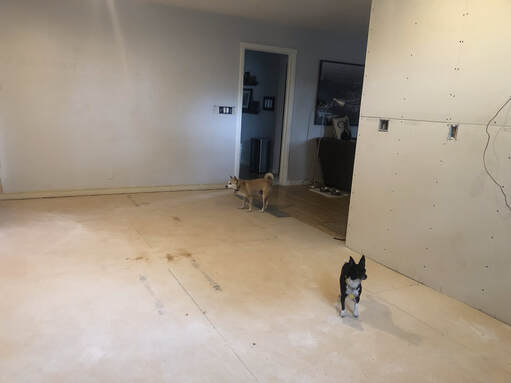
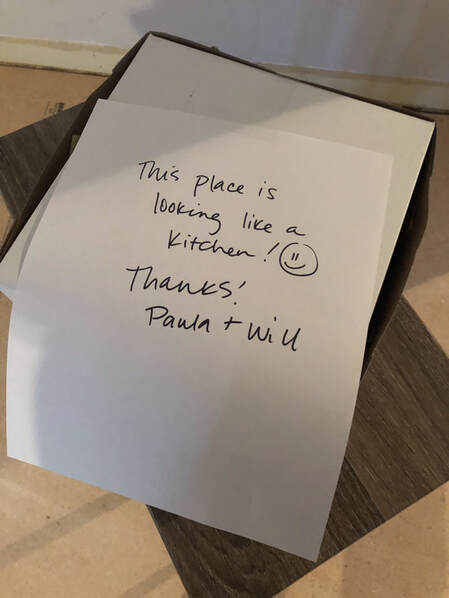
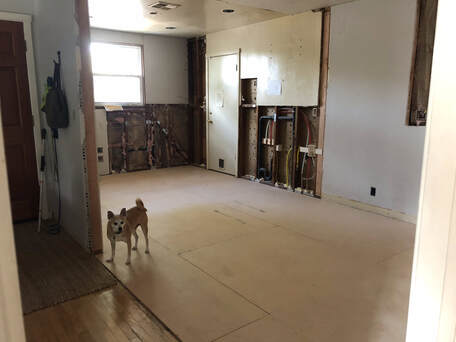
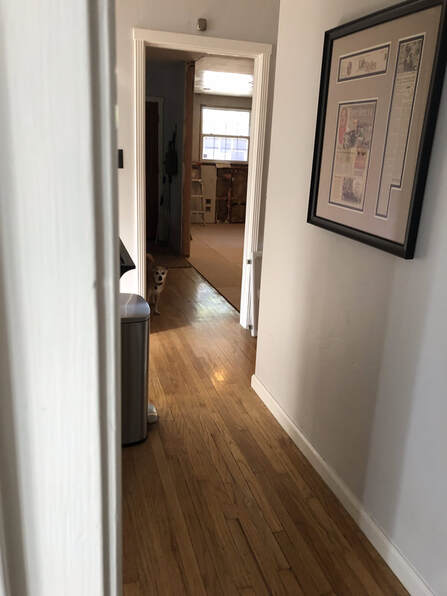
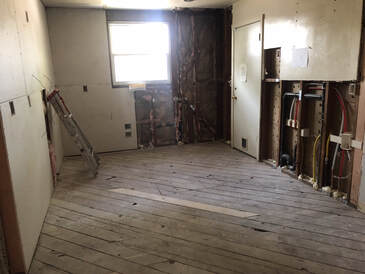
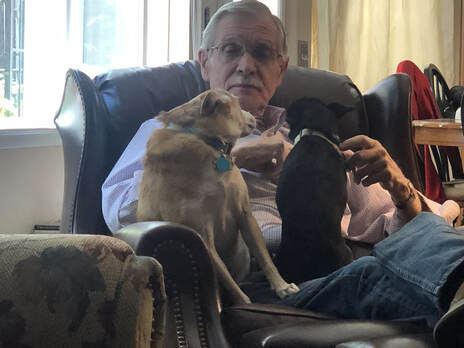
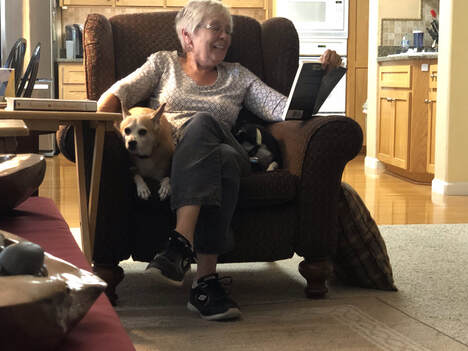
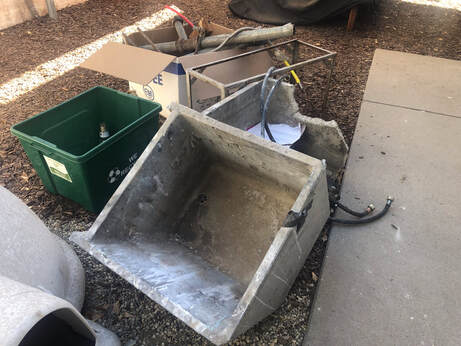
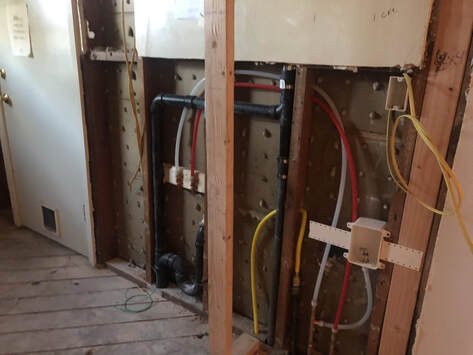
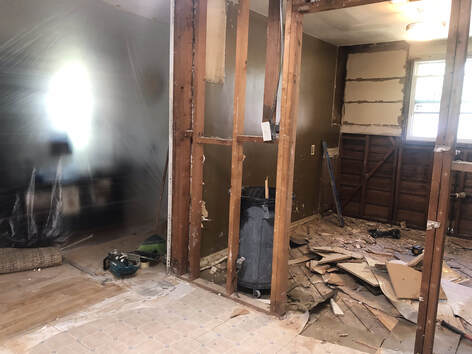
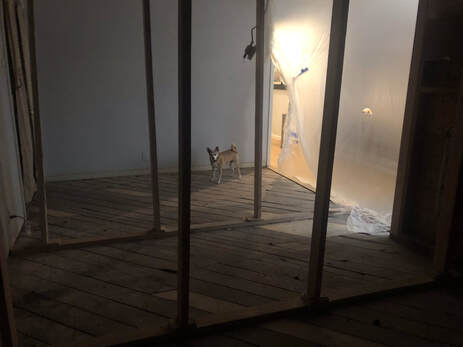
 RSS Feed
RSS Feed